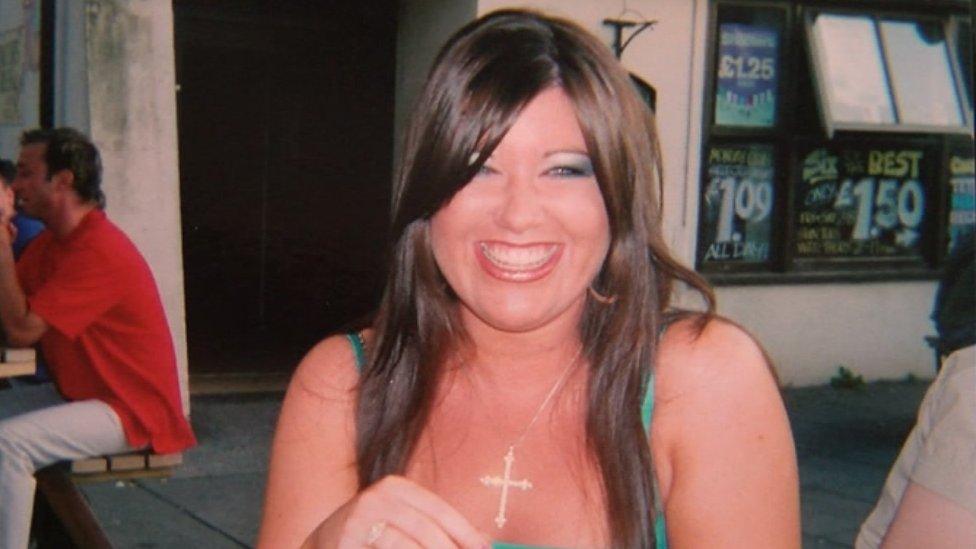'I took 57 painkillers a day to get high'
- Published
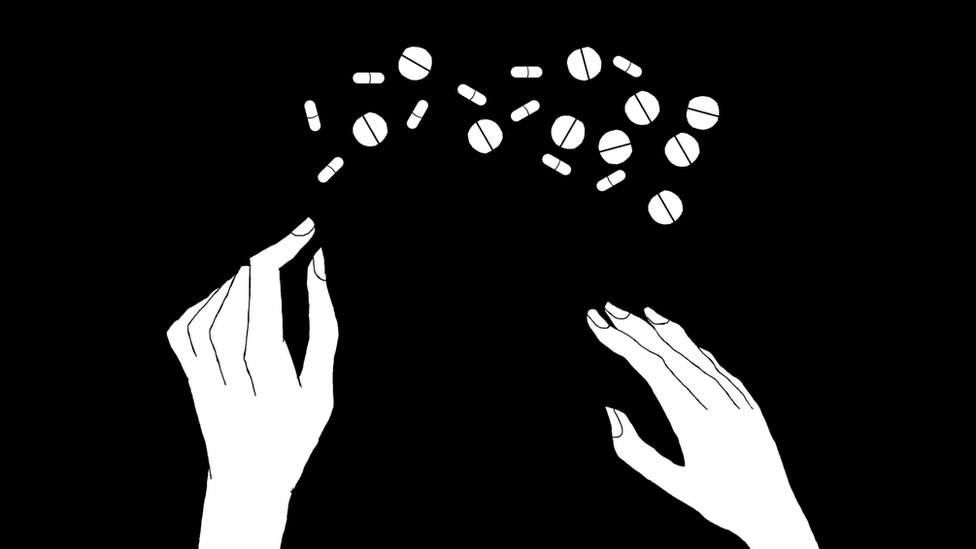
In December 2017 British woman Laura Plummer was jailed for three years for bringing 300 Tramadol painkiller tablets into Egypt. While the sentence shocked many in the UK, the case shone a light on a painkiller addiction problem blighting millions of Egyptians.
"When I was 15, we were playing PlayStation in a games arcade, and someone insulted me. I picked up a billiards cue and smashed it over his head. I was screaming abuse at everyone. I even broke the windows."
Abdul Hameed, now 24, remembers the moment he realised his drug habit had spiralled out of control.
Two years earlier, aged just 13, he had tried the opioid-based painkiller Tramadol for the first time.
Like many young Egyptians, he started by taking one quarter of a 100mg tablet to get high.

Abdul Hameed, 24, was using Tramadol from the age of 13
"I felt like I was a superhero," he says. "I could do anything."
By the time he went berserk in the games arcade Abdul Hameed was taking 57 painkillers a day - a mixture of Tramadol and other commonly available opioid-based tablets.
He has over-dosed and almost died several times since.
'The sad truth'
According to the Egyptian Fund for Drug Control and Addiction Treatment, more than 10% of the total population of nearly 100 million had used narcotics, and almost one-in-three addicts are hooked on painkillers. Tramadol is their drug of choice.
It first appeared on the market in Egypt 20 years ago. Cheaper than heroin and easily available, it quickly became popular with addicts and then spread to the wider population as a way to deal not just with physical pain but also the stresses of everyday life.
Tramadol has taken such a hold in Egypt that addiction helplines say they are getting as many as 500 calls a day from people desperate to break the habit.
Addicts are likely to be young. The government-run drug rehab centre at Cairo's Abbasiya Psychiatric Hospital told the BBC more than half its patients are aged between 21 and 30.
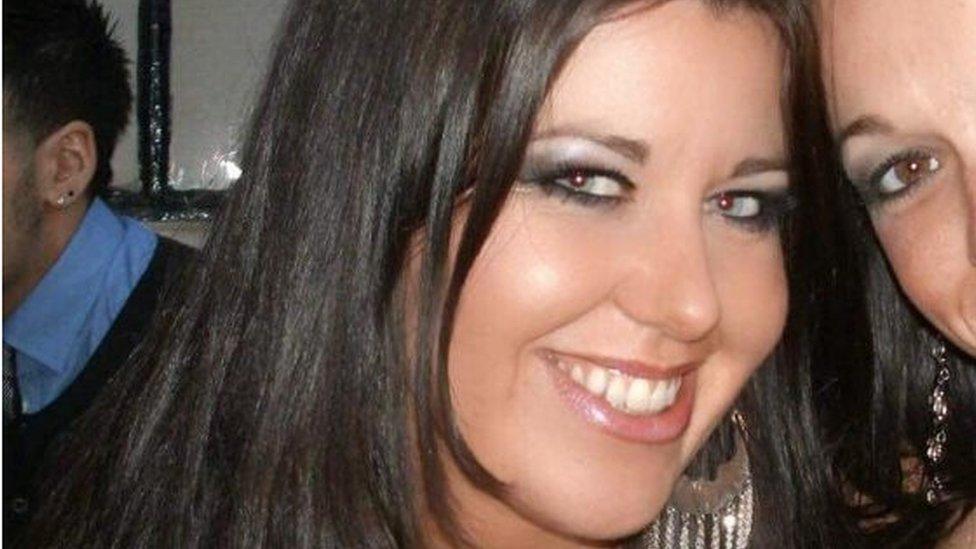
Briton Laura Plummer was jailed for three years for smuggling 300 Tramadol tablets into Egypt
According to official statistics most Tramadol addicts in Egypt are men - around 70% - but there are also a growing number of women.
Young mum Ahlam started taking Tramadol to cope with the drudgery of housework and childcare.
Like Abdul Hameed she began with a quarter of a 100mg tablet, but quickly progressed to four tablets a day and now, even if she ups the dose the drug no longer has the same effect.
"I used to enjoy the energy surge," she says. "But now the high isn't there anymore."
The toll addiction is taking on Ahlam is plain to see. She is pale and thin, chain-smokes cigarettes, and looks much older than her 28 years.
Her family are also suffering.
"My husband gave me money to buy chicken," she says. "I pretended I'd bought some and the children had eaten it all. But of course it wasn't true. I used the money to buy Tramadol and I fed them cheap pasta instead. This is the sad truth."
Ahlam has sold things from the family home to make money to feed her drug habit, and at one particularly bleak moment she even offered sex to a neighbour, also an addict, in return for some pills. He refused.
Over the counter
One of the reasons Tramadol has become so popular in Egypt is that it is so easy to get hold of.
By law it can only be sold on prescription, and pharmacists caught selling it without a prescription face up to 25 years in jail.
But addicts say the restrictions are widely ignored.
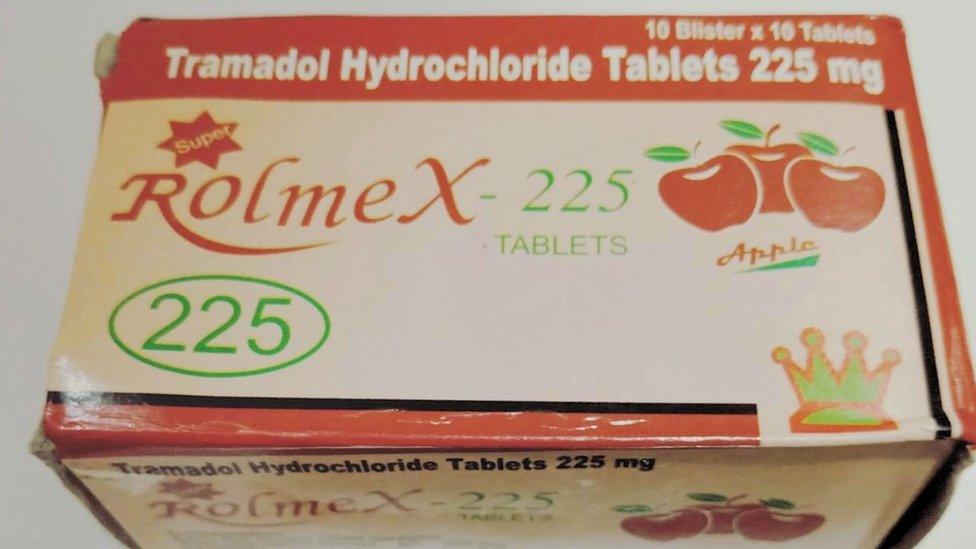
Tramadol can only be legally obtained by prescription in Egypt
This was the case when I walked into a pharmacy in central Cairo and asked for Tramadol.
I was told they had run out, and was offered two alternative and equally addictive painkillers instead.
At no point was I asked for a prescription.
Dr Yasin Rajal, the technical director of the Egypt's Central Administration for Pharmaceutical Affairs, told the BBC that the Health Ministry recognised the dangers of painkillers and was making efforts to to crack down on illegal sales.
"Various pieces of legislation are in place to regulate the sale of painkillers," he said. "The Health Ministry keeps an eye on pharmaceutical outlets in Egypt and works alongside the Ministry of the Interior to carry out inspections and spot-checks."
'Street market'
But even if the authorities could stop pharmacies selling Tramadol without prescription, users have found other ways to get hold of it.
So-called "doctor shopping" is now common practice. Addicts consult several doctors at the same time, feigning a back problem or a sports injury, and get several different painkiller prescriptions which they use in different pharmacies.
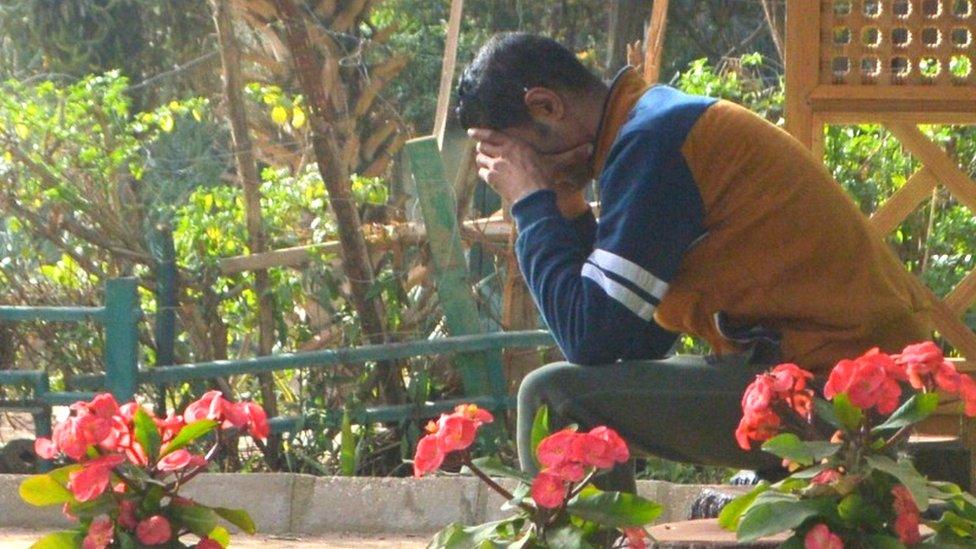
One in three Egyptians are addicted to painkillers
There is also a thriving black market.
In Egypt's third biggest city, Giza, south-west of Cairo, I visit a back street where addicts to come to buy their drugs.
The sun has just gone down and there are so many people milling around that it feels like an evening street market.
Dealers try to keep order, shouting at the crowds to stand in line - Tramadol to the right, hashish and heroin to the left. Many addicts are buying a drink they call "cockroaches" which is based on a drug used to treat Parkinson's Disease. It is all shockingly open and matter of fact.
Turning a corner
Abdul Hameed hopes that this is world he has finally left behind.
He is now three months into his latest attempt to kick his drug habit.
Several previous attempts have failed, on his own at home and in unlicensed "treatment warehouses" where addicts are locked in a room and left alone to deal with the withdrawal symptoms. Now he is in a private clinic.
"They give us different medication to treat the withdrawal symptoms, and gradually reduce the dosage of addictive substances," he says.
"We attend meditation classes, play sport, share experiences. I feel like I'm born again."
For the first time in years he is starting to look to the future with hope.
"I've started private tuition to prepare to go back to school," he says.
He dreams about getting married one day and having children. He's also hoping to train as a drug treatment specialist.
More than anything else, he says, he wants to try to use his own battles with addiction to help others.
Top picture illustration by Ismail Moneer
Correction 4 June 2018: This story has been amended to make clear that almost one-in-three drug addicts in Egypt are hooked on painkillers, rather than one-in-three Egyptians as stated in an earlier version.
- Published26 December 2017
